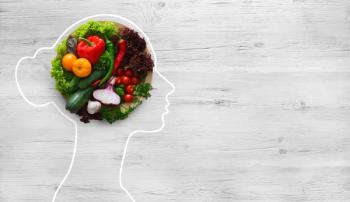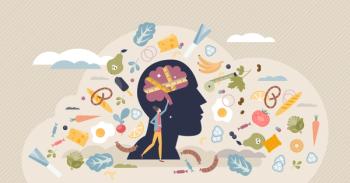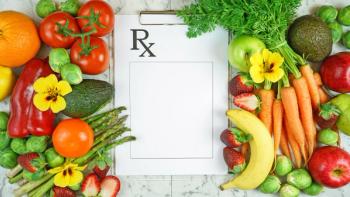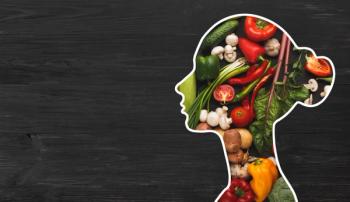
Supporting Healthy Eating in Your Patients: A Nutritionist’s Advice
Here’s how to support patient mental and physical health through a nutrition lens.
Often in western medicine, the mind and body are treated separately—as if they are entities that do not deeply rely on one other to work well. We are not disembodied heads resting on top of a separate body. The mind and the body are interconnected and need to be addressed as a whole.
As a registered dietitian (and
So, let’s talk about nourishment. We are not talking about an “all or nothing” approach to eating. In fact, this message to our patients that they need to eat or should be eating better foods can actually be counterproductive. This “eat better” message washes over all of us so frequently that, at best, it is background noise—at worst, it is actually harmful. Feelings of self-control around food can increase feelings of guilt and shame.1
Simply telling a patient to do something very rarely works, even more so when that message has to do with food. For so many individuals, the message to “eat well'” morphs into a morality of good foods versus bad foods. Add to this the stigma of weight, and things can get a whole lot harder.2
To avoid this, I work to encourage patients to be active in their own care by sharing the why. The why in this case is eating foods for the nourishment they bring: the unseen micronutrients and phytochemicals that play such a huge role in total mental and physical health. This often leads to patient buy-in and enthusiasm.3 Instead of listing forbidden foods, or foods that should never be eaten, we celebrate the science behind what we want to add to our menu.
Read on for our favorite examples of nourishment for your mental health.
1. Eggs
Scrambled, sunny up or down—enjoy an egg (and with an entire yolk). Yes, I can hear you from here: “Oh but the cholesterol!” It is okay—a healthy liver can clear a decent amount of dietary cholesterol easily. An egg a day is fine.4 Egg yolks are loaded with choline, a nutrient that is amazing for the brain itself (in fact, there is a lot of research looking at maternal choline consumption and offspring cognition).5 Choline, a nutrient essential for many functions through the body, is needed to produce acetylcholine, an important neurotransmitter for memory, mood, muscle control, and other brain and nervous system functions.6 There is also a negative association between low choline status and high anxiety.7 Start your day with an egg, or boil a few for your next salad. Adding just a bit of those super helpful nutrients can make a difference!
2. Mushrooms
This squeaky, yummy fungus food is amazing for mental health. Truth be told, it is likely the vitamin D doing the heavy lifting.8 There are very few foods that naturally contain vitamin D because, as humans, we evolved to get all the vitamin D we needed from sun exposure—which, of course, we shy away from given the dangers of skin cancer. However, mushrooms are the umami exception, as they contain varying amounts of vitamin D and even ramp up production after exposure to light.9 Vitamin D supplementation has been associated with a significant reduction in Beck Depression Inventory (BDI) scores and Pittsburgh Sleep Quality Index (PSQI). That is 2 extremely powerful outcomes for 1 vitamin. The doses in these studies were at the supplementation level,8 but eating mushrooms with their bonus vitamin D can be a tasty way to take control of your mental health.
3. Berries
Berries are one of the best foods for physical brain health and cognition.10 The body’s systems are highly interconnected, and, given this data, it is a safe leap to assume that mental health can also be supported by eating berries. Eating berries along with other amazing foods, like citrus fruits and dark leafy veggies, is associated with higher levels of optimism and protection against some depressive symptoms.11 The trouble with berries is that they can be pretty expensive; however, frozen is just as good as pricey fresh fruit.
Focusing on these healthy, whole, and fresh foods can bring positivity to your nourishment. But it can also be helpful to share foods that may work against our mental health goals. The following are a few types of foods to either limit or avoid altogether.
1. Alcohol
That relaxing glass of wine at the end of the day may, in the short term, feel like a support for mental health. Many individuals find joy in the ritual of an after-work glass or 2 of alcohol. Like most things, in moderation, a glass or 2 of wine a week may not have a huge effect on health. Aside from all the drug-nutrient interactions a patient is at risk for when he or she drinks alcohol,12 ethanol is a depressant and research has shown strong associations between increased alcohol consumption and poor overall mental health.13 This is not a surprise, and it should also be noted that overdoing it with alcohol can burn through a slew of B-vitamins, a collection of nutrients incredibly important for mental health.14 Just getting curious about alcohol use—noticing why you are choosing to drink, whether you even enjoy it, or if you are reaching for alcohol for other reasons—can be a helpful practice to support mental health.
2. Ultra-Processed Foods
This huge category of foods refers to fast food, snack foods, processed meats, sweets, and soft drinks—pretty much what many of us are eating too much of every day.15 But where is the risk? In a study published this year, researchers reported that during the height of the COVID-19 pandemic, consumption above the weekly average of ultra-processed foods was associated with a higher prevalence of anxiety.16 In this same study, it was reported that, conversely, eating more healthful foods was associated with a lower prevalence of anxiety (yes, eggs were on that list). Reaching for ultra-processed foods provides an opportunity to practice both mindfulness and, specifically, mindful eating. Why are you choosing that bag of chips right now—are you feeling sad and want something to provide comfort? Do you deserve a “treat”? These are all opportunities to increase your awareness of why you are making this food choice.
3. Energy Drinks
Storming onto the scene in the United States in 1997, energy drinks are now everywhere and are being consumed at an alarming rate. The caffeine content of some of these drinks is sometimes over 550mg (for reference, a cup of traditional drip coffee has about 100mg of caffeine).17 An energy drink after a long night or to get that occasional afternoon boost does not seem to pose too harsh an effect on mental well-being. Chronic use, on the other hand, has been associated in case studies and in a few larger studies with anxiety, depression, and stress.18 Many patients have a hard time weaning themselves off these beverages. I have found that the best approach is patient-specific: to describe the problem to the patient and give them the power to decide if they feel cutting back on energy drinks or eliminating them is worth it. Advising a patient to understand the connection between their choice of drink and their subsequent emotional reaction can be extremely helpful in supporting long-term mental and physical health.
Concluding Thoughts
The mind-body connection can no longer be ignored. As a registered dietitian, I need to focus on the whole human—their mind and body. As we know, areas of nutrition can directly affect mental health. Our bodies are complex, interconnected systems that rely on one another. Focusing on holistic, nourishing, and preventative support can be a game changer. Let’s remove the stigma that eating well is to be done when we want to be a certain number on the scale. Let’s instead celebrate the choline in eggs and the power of the berry in managing anxiety. This elegant symbiosis of our mind and body needs to be addressed together, and it is time to have these conversations with our patients for healthier humans and a healthier society.
Ms Keyes is a clinical instructor and the director of nutrition and wellness for the newly launched holistic health app,
References
1. Kuijer RG, Boyce JA, Marshall EM.
2. Wellman JD, Araiza AM, Newell EE, McCoy SK.
3. Paterick TE, Patel N, Tajik AJ, Chandrasekaran K.
4. Carson JAS, Lichtenstein AH, Anderson CAM, et al.
5. Derbyshire E, Obeid R.
6. Choline fact sheet for health professionals. National Institutes of Health. Updated March 29, 2021. Accessed Apirl 8, 2022.
7. Bjelland I, Tell GS, Vollset SE, et al.
8. Jamilian H, Amirani E, Milajerdi A, et al.
9. Cardwell G, Bornman JF, James AP, Black LJ.
10. McEvoy CT, Guyer H, Langa KM, Yaffe K.
11. Głąbska D, Guzek D, Groele B, Gutkowska K.
12. Seitz HK.
13. Jacob L, Smith L, Armstrong NC, et al.
14. Young LM, Pipingas A, White DJ, et al.
15. Juul F, Parekh N, Martinez-Steele E, et al.
16. Coletro HN, Mendonça RD, Meireles AL, et al.
17. Reissig CJ, Strain EC, Griffiths RR.
18. Richards G, Smith AP.
Newsletter
Receive trusted psychiatric news, expert analysis, and clinical insights — subscribe today to support your practice and your patients.







